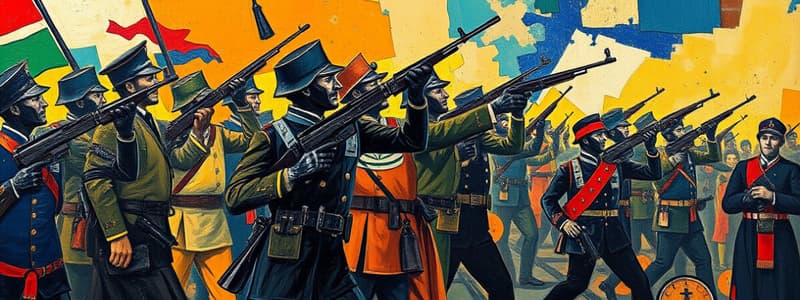Podcast
Questions and Answers
What was militarism and what did it cause?
What was militarism and what did it cause?
The building up of an army or military to become more powerful; caused competition to be most powerful and fear of being taken over.
What is the main concept of alliances? What were some examples in this time period?
What is the main concept of alliances? What were some examples in this time period?
- Countries forming economic partnerships
- Countries hosting Olympic games together
- Countries promising to help each other in war (correct)
- Countries trading resources
What is imperialism and what was it caused by?
What is imperialism and what was it caused by?
Stronger countries taking over weaker territories to gain power and benefit economically, politically, and socially; directly related to industrialization.
What is nationalism and what did it cause in WWI?
What is nationalism and what did it cause in WWI?
What was the tipping point of the war and how did this cause the war to be a world war?
What was the tipping point of the war and how did this cause the war to be a world war?
What were 3 out of the 5 reasons why the US entered WWI?
What were 3 out of the 5 reasons why the US entered WWI?
What were two ways America paid for WWI?
What were two ways America paid for WWI?
Describe The Great Migration.
Describe The Great Migration.
Who were the Central Powers?
Who were the Central Powers?
Who were the Allied Powers?
Who were the Allied Powers?
Describe No Man's Land in the trenches.
Describe No Man's Land in the trenches.
What was the Zimmerman Telegram?
What was the Zimmerman Telegram?
What is the Treaty of Versailles?
What is the Treaty of Versailles?
What were the harsh terms of the Treaty of Versailles for Germany?
What were the harsh terms of the Treaty of Versailles for Germany?
Name 2 examples of weapons of mechanized warfare introduced in WWI.
Name 2 examples of weapons of mechanized warfare introduced in WWI.
Flashcards are hidden until you start studying
Study Notes
Main Causes of World War I
- Militarism: Increasing military strength led to competition among nations and heightened fears of invasion.
Alliances
- Definition: Agreements between countries to provide mutual support, mainly in times of conflict.
- Examples:
- Allied Powers included France and England supporting Serbia.
- Central Powers consisted of Germany and Austria-Hungary, with Italy initially allied.
Imperialism
- Definition: Powerful nations expanding their influence by dominating weaker territories to achieve economic, political, and social benefits.
- Relationship to Industrialization: Emerged from advancements in production capabilities, enabling mass weapon production.
Nationalism
- Definition: Extreme pride in one’s nation leading to heightened competitiveness.
- Consequence in WWI: Increased tension and fear of domination among nations.
Tipping Point of the War
- Event: Assassination of Archduke Francis Ferdinand and his wife, leading to Austria-Hungary's war against Serbia.
- Consequences: Triggered alliances, causing widespread conflict and making the war a global issue.
Reasons for U.S. Entry into WWI
- Economic Interests: American businesses with investments in Britain favored the Allies.
- Lusitania Incident: German u-boat attack sank the passenger liner, killing 1,200, including 128 Americans.
- Zimmerman Telegram: Secret communication from Germany proposing a Mexican alliance against the U.S.
- Unrestricted Submarine Warfare: German u-boats attacking American merchant ships.
- Alliance with Britain: Established a strong connection and solidarity with the Allied Powers.
Financing WWI
- Methods: The U.S. financed the war effort through tax increases and the sale of war bonds.
The Great Migration
- Timeframe (1914-1919): Significant movement of African-Americans from Southern states to Northern cities, seeking better opportunities.
Central Powers
- Members: Comprised Germany, Austria-Hungary, and Italy.
Allied Powers
- Members: Included Britain, France, Serbia, and the USA.
No Man's Land
- Definition: A desolate and dangerous area situated between opposing trench lines.
Zimmerman Telegram
- Content: A German proposal to Mexico, suggesting support against the U.S. in exchange for reclaiming lost territories.
Treaty of Versailles
- Overview: The peace agreement that ended WWI formally.
Harsh Terms for Germany in the Treaty of Versailles
- Territorial Concessions: Required to cede various territories.
- War Guilt Clause: Germany was to accept responsibility for the war.
- Reparations: Obligated to pay substantial war reparations.
- Military Restrictions: Size and strength of their military forces were to be significantly reduced.
Weapons of Mechanized Warfare
- Innovations:
- Introduction of airplanes and tanks.
- Advancements in machine guns and heavy artillery.
Studying That Suits You
Use AI to generate personalized quizzes and flashcards to suit your learning preferences.




